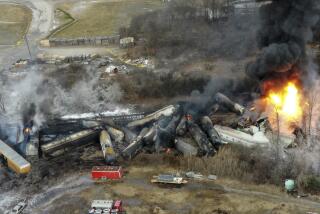GM Urges Expansion of Accident Database
- Share via
DETROIT — The vice chairman of General Motors said Wednesday that the Firestone tire crisis has exposed the need for better information gathering about traffic accidents, such as an improved government database and even an on-board data recorder for cars such as those on airliners.
In an interview with The Times, Harry Pearce said those improvements would be a more constructive response to the tire failures than passing legislation that could make criminals out of auto executives.
“What you need is a cooperative relationship where the industry is working hand in hand with the government agency to understand failure modes if they are occurring in products so we can quickly get to the bottom of understanding the failure,” Pearce said.
He said GM is urging members of Congress and federal regulators to expand the government’s database of auto accidents so that defective products, such as tires that lose treads, can be detected earlier.
The National Highway Traffic Safety Administration’s accident database should include serious injuries as well as fatalities to broaden the sample of incidents involving potential defects, Pearce said. NHTSA’s Fatality Analysis Reporting System is flawed, he said, because only accidents that involve deaths are entered, and the data are sometimes from second- or third-hand observations, not, for example, from a forensic examination of a failed tire.
It could be as simple as including accidents that result in injuries. “The beauty of that, the power of it is it’s a much larger database, and would allow, in our judgment allow a more robust statistical analysis of trends, what’s happening with regards to specific products,” he said. Pearce claimed such a database would instantly grow from the 40,000 to 45,000 traffic fatalities a year to 300,000 to 400,000 annual incidents.
NHTSA’s accident data collection has come under fire because many of the entries are incomplete or unintelligible. The scrutiny has arisen in the wake of the massive recall of Firestone tires, which have been linked to 101 deaths. Critics say if the database were better maintained and broader, problems with the tires might have been spotted years before the Aug. 9 recall.
“The next step quite frankly would be to use actual on-board recorders to record data just prior to and in the course of an accident. Black boxes, in effect,” Pearce said. “There are privacy issues that we want to thoughtfully address with our customers, but on the other hand, if there is a serious accident, everyone wants to understand why, what caused it.”
Pearce also assailed proposed legislation that could facilitate prosecution of auto executives for failing to report product failures, or for selling vehicles they knew had defects. A rush toward possible criminalization could actually hurt automotive safety, he said, shutting down the flow of information by telling people they risk criminal liability.
“If indeed there is a design defect in the product, that we can identify and objectively define, then we fix it--don’t criminalize it, fix it,” said Pearce, a veteran litigation attorney who was once GM’s general counsel. “We ought to be worried about the lives and the health of our consumers who are in these products, not what happens in Washington, or what happens in the courts.”






